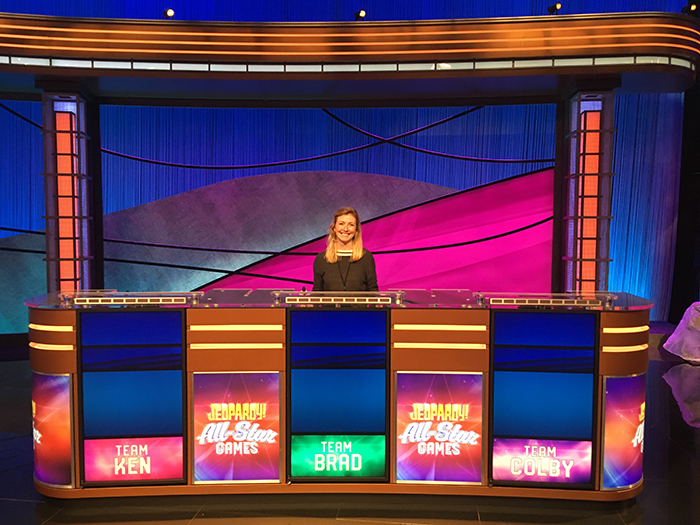
(Illustration by John Jay Cabuay)
And other reflections from the author of a new book on Jeopardy!
In a time of national division, Americans still agree on one thing: Alex Trebek. If you talk to people about Jeopardy!, “they just light up. Everybody’s got a Jeopardy! story,” says journalist Claire McNear, AB’11. She’s the author of Answers in the Form of Questions: A Definitive History and Insider’s Guide to “Jeopardy!” (Twelve, 2020). Her comments on the beloved game show have been edited and condensed.
What has given Jeopardy! such enduring appeal?
I think it’s both that it is a really good game—you get through 61 questions in a game of Jeopardy!—but also that it has a sense of humor about itself.
What do you think will happen after Alex Trebek retires?
One of the beautiful things about Jeopardy! is it doesn’t change. If you watch an episode filmed a year ago versus one that was filmed 15 years ago, Trebek might have a mustache in the older one, but other than that, it’s the exact same show.
And now there might be change. Trebek has been doing this since 1984. He turned 80 over the summer, and he is going through a difficult health situation. It’s reasonable to think that the guy might want to retire at some point, someday.
It’s not clear what will happen. Jeopardy! will definitely continue. Alex Trebek is the first person to say he wants it to go on after him. I think everybody has their favorite pick. I’m partial to the idea of bringing in one of the storied contestants, like a Ken Jennings or a Brad Rutter.
Trebek has also said that he thinks it will be a woman. The world of game show hosts is a very male, very White space. If they find a way to do something different, that would be phenomenal.
Do you think Ken Jennings’s new role as a Jeopardy! producer is a sign he is being groomed to host the show?
I asked Jeopardy!’s executive producer Mike Richards the same thing, and he said it shouldn’t be read that way—even after pandemic restrictions are lifted, Ken isn't likely to be around the set on a day-to-day basis, so he is hardly assuming cohost duties. His role now is more about contributing clues (which makes sense, given he wrote a trivia almanac and has a long-running weekly trivia newsletter) and helping with recruitment. Having said that—and this is purely speculation on my part—I don’t think it's a bad guess that the odds of Ken continuing to be prominently involved in the show are going down.

You’ve argued that Jeopardy! is a sport. Why?
People train for Jeopardy! in a way that I think most casual viewers don’t understand. They move all their furniture around and practice standing at a podium. James Holzhauer would wear uncomfortable dress shoes. It’s always really cold in the studio, so people chill their homes to 52 degrees. It’s a mental competition, but a physical one too.
Advanced statistics are currently going mainstream on Jeopardy! If you look at people like James Holzhauer or UChicago’s own [user experience librarian] Emma Boettcher, the way they play the game says so much about the way people study it now—figuring out the exact place where a Daily Double probably is, or the exact amount you should wager in Final Jeopardy!, or the exact subjects that you should study if you have a month until you tape.
What separates the best contestants from others?
You can ignore all the other pieces of James Holzhauer’s strategy and look at the fact that he was almost always right. He averaged one wrong answer per game. He just knows so much.
But then, to get back to the sports part of this, there’s the buzzer. People practice to get their buzzer timing just right. The truth is you never really know if you have it until you’re up there on the stage playing.
Tell me about the buzzer guru, Fritz Holznagel.
He was a contestant in the ’90s, did really well, and got invited back to a series of additional tournaments.
As he was training for this next appearance, he decided that he was going to get really good at the buzzer, because he wasn’t going to win on raw knowledge. He ended up writing a book called Secrets of the Buzzer that outlines the things he learned. He built his own buzzer and came up with some best practices: you should always use the thumb of your dominant hand, you should always keep your hand in front of you, and you should chug a cup of coffee just before you go on the stage.
What you can’t see when you watch Jeopardy! is there’s a row of blue lights around the board, and when the lights go on, that’s when the buzzers awaken. There are two major schools of thought on what to do with the buzzer. Should you listen for the sound of Alex Trebek’s voice or should you wait for the light? Holznagel advises you to look at the lights.
Ken Jennings and Brad Rutter, the all-time highest winner, both go by sound. James Holzhauer followed Fritz Holznagel’s advice, and obviously, it worked out pretty well for him.
What’s the role of star contestants in the show’s popularity?
What’s interesting about Ken Jennings, in addition to how many games he won, is that he first went on the show just after they lifted the limit on returning champions. It used to be that no matter how well you did, you got kicked off after five wins. And then, of course, he won 74 games.
It was a deliberate marketing ploy by the executive producer Harry Friedman, who saw that this would let people root for contestants. But I don’t think Jeopardy! ever could have imagined that it would open the door to contestants becoming characters in the way, like, you’re a James Holzhauer fan or a Ken Jennings fan or a Brad Rutter fan. When James was on last year, I was watching every night, like, oh my God, is this the one?
Did your family watch the show?
Definitely, yes. We were not a game show family: it was Jeopardy! or nothing, and I think a lot of Jeopardy! fans are that way.
I am actually not very good at trivia. I just so don’t have that trivia brain. For my book, I went to an audition and talked to the producers and some of the people trying to get on the show, and the producers made me take the contestant test. I’ll save it for the book, but it could’ve gone better. The fun of it is getting to try.
Do you have a favorite non–household name Jeopardy! contestant?
I think she is a household name, but we cannot talk about Emma Boettcher enough. I’m not pandering because this is UChicago, I promise. She’s so good.
They tape five games in a row. The people arriving to start that five-game day don’t know anything about what happened the day before. In her case, the contestants showed up and found out that James Holzhauer had won 32 games and millions of dollars. She got randomly called up to be in the very first game, and she beat him with his own strategy.
My sense is the show’s fan community is unusually warm. Is that fair?
As with anything online, it’s not universally lovely, but that is mostly right. I think it comes down from the show. They do not refer to people who lose games as “losers.” They call them “non-winners.” That spirit has been adopted by the Jeopardy! community at large.
It’s about celebrating people doing this weird thing that they love and they’re good at. One of the great things about Jeopardy!—and one of the things about it that reminds me of UChicago a little bit—is that it’s just a lovely place for dorks.
Is there a final piece of Jeopardy! trivia you want to share?
So I stumbled across this in my research: In 1999 there were Jeopardy! College Championship auditions on the UChicago campus. At that point the entire undergraduate student body was under 4,000 people. Something like 2,500 students showed up. They ran out of test sheets.
